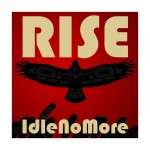Gyasi Ross, Indian Country Today Media Network, indiancountrytodaymedianetwork.com
INTRODUCTION
Lately, Native people have taken to the streets malls in demonstrations of Public Indian-ness (“PI”) that surpasses the sheer volume of activism of even Alcatraz and the Longest Walk. There’s a heapum big amount of PI going on right now! Many people, non-Native and Native alike, are wondering what the heck is going with their local Native population and how this so-called #IdleNoMore Movement managed to get the usually muffled Natives restless enough to be Indian in public. I mean, like Chris Rock said, he hasn’t ever even met two Indians at the same time. He’s seen “polar bears riding a tricycle” but he’s “never seen an Indian family just chillin’ out at Red Lobster.”
Yet, now people can’t seem to get away from us.
And that’s cool—but isn’t that what pow-wows and November is for? People (non-Native and Native alike) can only take so much PI, right? Is that what the Idle No More Movement is—an extended Native American Heritage Month, where non-Natives have to act like they’re fascinated by Native culture?
In a word, no. It is much more. Please consider this a fairly exhaustive explanation of the Idle No More Movement, what it is not and what it is. If for some reason you cannot read the next 1000 or so brilliant words, I can be summed up thusly: the Idle No More Movement is not a new movement. Instead, it is the latest incarnation of the sustained Indigenous Resistance to the rape, pillage and exploitation of this continent and its women that has existed since 1492. It is not the Occupy Movement, although there are some similarities. It is not only about Canada and it is not only about Native people. Finally, and probably most importantly, it (and we) are not going away anytime soon. So get used to it (and us).
#IDLENOMORE MOVEMENT: WHAT IT IS ABOUT
“The ground on which we stand is sacred ground. It is the blood of our ancestors.”
Chief Plenty Coups, Apsaalooke
“…you have come here; you are taking my land from me; you are killing off our game, so it is hard for us to live.”
Tasunke Witko (Crazy Horse), Oglala Lakota
As the above quotes display, the Indigenous Resistance to the raping and pillaging of the Earth is not new. Likewise, Indigenous peoples’ efforts to protect the mothers of our Nations—the women—are not new either. The Idle No More Movement is simply the latest chapter in that resistance.
It’s About: PROTECTING THE EARTH. Idle No More is an inherently grassroots and localized movement, informed by the founders, but with local flair.
Photo art by Steven Paul Judd
First and foremost, the Idle No More Movement is about protecting the Earth for all people from the carnivorous and capitalistic spirit that wants to exploit and extract every last bit of resources from the land. Therefore, anybody who cares about this Earth should be interested in the Idle No More Movement. The engineers were Nina Wilson, Sheelah Mclean, Sylvia McAdam and Jessica Gordon. It was a response to Canada’s Bill C-45, which overhauled the Navigable Waters Protection Act and removed protections for many waters that go through First Nations. Changing the Act literally moves the emphasis of the protection—it morphs from protecting the waterways to protecting the navigation on those waterways. Now, instead of 30-some thousand lakes being protected under the old Act, only 97 lakes will be protected. As Canadian Parliament Member Kirsty Duncan eloquently states, “The days when Canadians take an endless abundance of fresh water for granted are numbered…”
These mobilized Native people wanted to ensure that children two, three and twelve generations from now would have clean water. The children who will benefit from the Native mobilization are not just Native children—it’s for all children. Lakes and rivers tend to be either clean or dirty for Native and non-Native children alike.
It’s not a Native thing or a white thing, it’s an Indigenous worldview thing. It’s a “protect the Earth” thing. For those transfixed on race, you’re missing the point. The Idle No More Movement simply wants kids of all colors and ethnicities to have clean drinking water. It’s also not a “Canada” or “United States” thing. Multinational corporations do not care about borders and neither should we. Despite legislation to intended to prevent pollution, corporations pollute freely with almost complete impunity and our children are the ones who suffer. We likewise should not care about borders—we are mobilizing on both sides because we understand that what we do affects one another.
We will continue to aggressively organize and be Idle No More about the attempts to destroy our sacred lands, whether its Keystone XL Pipeline or Tar Sands Mining in Canada. We will be Idle No More on SSA Marine’s attempts to create a deep-water shipping terminal for water and air poisoning dirty coal in the Lummi waters near Puget Sound, WA or any disrespect to our lands.
We’re not going anywhere, we’re not going to be silent, we’re Idle No More !
It’s About: PROTECTING WOMEN. Similar to the sustained, capitalistic effort to exploit and pillage the Earth, the carnivorous, capitalistic nature has also exploited and abused women since the founding of both America & Canada. That is something else about which Indigenous people have vowed to be Idle No More. America’s first marriage and property laws, or ‘coverture,’ stipulated that married women did not have separate legal existences from their husbands. Indeed, a married woman was a dependent and could not generally own her own property or control her own earnings. “…once she married she became a legal nonentity. Her husband not only assumed her legal privileges and duties but certain rights to her property as well.” (Women, Family, and Community in Colonial America: Two Perspectives, Linda E. Speth, Alison Duncan Hirsch, Pg. 8.)
And that was for privileged white women. Obviously for Native women, Black women and any women of any other color who were unfortunate enough to live in the United States, it was much worse.
Deborah Parker speaking about Violence Against Women Act at Seattle Idle No More rally. Image courtesy Alex Garland Photography
That pattern of condescension and indeed hatred for women has continued until the present. From the case Bradley v. State which affirmed a man’s “right” to “moderately” beat his wife to the Indian Health Service’s pattern of forced tubal ligations of Native women, the United States has shown a consistent trajectory of hatred and destruction for Native women.
Congress’s recent failure to pass the Violence Against Women Act—specifically because Republicans did not want tribal law enforcement to be able to prosecute non-Native sexual deviants—is a continuation of that exploitation of our women. Similar to the “clean water” discussion, above, the protections afforded by the Violence Against Women Act protected women of all colors—not just Native women. Conversely, Congress’s failure to act on the Violence Against Women Act hurts all women. Strong Native women leaders like Deborah Parker and others are advocating for safety and reauthorization of the Violence Against Women Act for all women, not just a few.
It’s not a Native thing.
It’s a “NO women, of ANY color, should have to worry about getting raped” thing.
It’s a “NO women, of ANY color, should get beaten and battered” thing.
Those who are transfixed by race, again, are missing the point.
And we will continue to organize and be Idle No More about this attack on the women within our communities, as well as all communities. That is not new and it’s also not just about Native people.
We’re not going anywhere, we’re not going to be silent, we’re #IdleNoMore !
It’s Not an OCCUPY MOVEMENT. The Occupy Movement was powerful and necessary—yet the foundation was frankly not strong enough to sustain. Occupy was about a slowed-down economy and a lot of folks who were, unfortunately, out of work from that slowdown. As the economy began to improve in 2012 and also, significantly, the weather got colder, the Occupy Movement got noticeably weaker. As the economy got stronger, the sheer amounts at the Occupy events got smaller. Now, it looms very strong in everyone’s psyche, whether we choose to acknowledge it or not; Occupy emboldened the Idle No More Movement, just like Syria, Egypt and Libya emboldened the Idle No More Movement. Absolutely. Still, Idle No More is NOT Occupy for these reasons:
The Primary Reason #IdleNoMore is Not Occupy—Native economies are NOT getting any better. In many of our communities, there is 70% PLUS unemployment—more than a simple “boom and bust” economic upturn can fix. There are structural problems that will prevent a quick-fix, and therefore most Indigenous Idle No More will not have an economic incentive to stop their activism.
#2 Reason #IdleNoMore is Not Occupy—We’re Native… Hello? You’re not going to scare us off with the cold weather. My friends have literally texted me pictures of sisters and brothers in Alberta and Saskatchewan standing outside with #IdleNoMore signs in -35 degree weather; I have spoken at events where it is freezing and brothers and sisters are outside in t-shirts.
If we’re mobilizing 2,000, 2,500 people at an event in the freezing cold in January, just imagine how that number is going to multiply when it’s 65, 70 degrees outside.
#3 Reason #IdleNoMore is Not Occupy—Occupy was snapshot response to a 3 year economic downturn. #IdleNoMore is a continued response to more than 500 years of destroying the Earth and exploiting women. The foundation on which we’re building is literally centuries of resistance.
Finally, it’s not Occupy because we are surrounding our advocacy around the specific substantive areas that were discussed earlier—protecting the environment and protecting Native women via the Violence Against Women Act. Yes, like Occupy, this is grassroots—the people are fluid and definitely can change. Indeed, the specific subjects that we choose to organize around certainly could change in the future—whatever we need to be Idle No More about. Still, for now fighting against gratuitous exploitation of our lands and fighting against violence against women are areas where good organization can make a difference.
CONCLUSION
This has nothing to do with race or ethnicity. Native people did begin this movement—energized by Chief Spence’s sacrifice and sparked by the Four Founders’ initiative. Yet this movement belongs to anybodywho wants to stand up for the Earth and women and also make a positive change in the community. That means that non-Natives are certainly welcome. We need non-Natives involved to save this Earth, to give our children and grandchildren the same quality of life that we have enjoyed. It’s about clean water. It’s about clean air. It’s about safety for all women. It’s about making a positive change in our communities. Critics seem to be so caught up on race; yet even racists want their children to have clean water just like non-racists. Right? Well, we want racists (and NON-racists, of course) to have kids with clean water too. Oh, and we don’t want them to get raped or beaten either.
Not too unreasonable, is it?
Here’s a little music and video to close this piece. It’s a project that we (Rock Paper Jet Productions, LLC) did with rapper and producer Brother Ali. Coincidentally, it doesn’t mention race—it mentions wanting to make the world slightly better. And when it comes down to it, that what the Idle No More Movement is about.
“I want to pass this planet to my son
A little better than it was when they handed it to me…”
Peace.












